| |
| Kit
advice page - Crampons |
|
 |
 |
|
 |
| Welcome
to this kit focus |
 |
|
 |
 |
 |
 |
 |
We
are in the process of developing these equipment
advice pages for many of the key items of equipment,
in order to help people prepare better for their
trips. We are always editing these pages, so if
you have any feedback about information we should
add to the page, please let us know. |
|
 |
 |
 |
This
page has largely been written by Emma
from our Windermere
HQ, and it's here that most people
have their first contact with us, in person or on
the phone. We feel it's important that all our staff
are experts on the mountains and kit we offer, so
we are all involved in developing these advice pages. |
|
|
 |

|
 |
Which
crampons?
10
point or 12 point, or 12+ points? Dual point or mono
point? Alloy or Steel? Heel clip or strap? There are
so many questions and options when it comes to choosing
crampons, but the starting point must be 'What do you
want to use them for, and what terrain will you use
them on'. Do you need an around crampon that can be
used for a variety of terrain, or do you need a technical
crampon for high end ice? What type of footwear you
are going to use your crampons with is also an essential
decision as to which crampons are suitable. Proper fitting
of your boots properly is also key, if your crampons
are too big for your boots they will upturn your feet
in a way that could leave you at risk of an ankle injury.
To return to the equipment lists and advice pages
overview, please click
here.
|
|
 |
Why
use crampons?
Crampons are fixtures designed to attach onto your boots
as you walk or climb, and they are built specifically
for use over snow and ice. Crampons prevent damage to
either your feet or you walking boots, and also provide
you with better traction on slippery surfaces.

Rigid
or flexible?
Some crampons are rigid and some are flexible, dependent
on what classification of boots you are wearing. Crampons
come in varied amounts of rigidity and flexibility. If
you wear crampons with the wrong rigidity of shoes, such
as shoes that are not technical, or too flexible, your
crampon will simply fall apart.

Crampon
Ratings
Crampons come in three ratings, C1, C2 and C3.
C1 Crampons - a flexible style of crampon that is able
to fit a B1 Rated Boot.
C2 Crampons - a semi-rigid style of crampon that is able
to fit a B2 Rated Boot
C3 Crampons - a very rigid style of crampon that is able
to fit a B3 Rated Boot
Boot Ratings - Boots are within four rating categories:
B0, B1, B2 and B3.
B0 Rated Boots - Boots that are not crampon compatible,
such as very flexible, fabric based hiking or walking
boots.
B1 Rated Boots - Flexible boots that will fit C1, or flexible
crampons only.
B2 Rated Boots - Semi rigid boots that will fit C1 or
C2 crampons (flexible or semi rigid.) These are ideal
for summer routes and low level snow based routes, but
not for ice climbs.
B3 Rated Boots - Rigid boots that can fit C1, C2 or C3
crampons, and are suitable for highly technical Alpine
climbing routes. Usually very stiff, these can be made
from leather or plastic, and are very heavy. They come
with stiffer soles and supportive features for front pointing
en route. Insulation is usually common in B3 boots, but
they are far too heavy for simple summer routes.

Crampons
points
Points are the spikes of a crampon that run along the
main area of the crampon and dig into the terrain to provide
stability and grip.

Dual
point or Mono point?
- Front points are located in front of the toes and disperse
debris and ice or rock. Most crampons have two front "Dual"
points for general purpose climbing; however single "mono
points" are useful on some technical route climbs
for more precision.
How many points?
10 point crampons are advised only for walking, trekking
and on general routes such as summer alpine routes
12 point or more are technical crampons designed for trad
and ice climbs where you need a firmer grip on steep ice.

Steel crampons VS
Aluminium?
Steel Crampons
These are durable and hardwearing on stiff fixed terrain
and obstacles, making them ideal for general mountaineering
and ice work. However steel crampons are heavy in weight.

Aluminium
Crampons
Lighter in weight than steel framed crampons, these are
ideal for use on alpine climbing routes and general approach
climbs, but have less durability than steel, particularly
on rocky terrain.

Heel
clip or Heel strap?
Heel CLIP: A hybrid system with a toe strap and rear heel
bail, designed for appropriate boots with a heel welt.
Heel STRAP: Flexible toe and heel attachments for use
with approach shoes or non-technical mountain boots.

Anti-balling plates?
Anti-balling plates made from ABS plastic prevents snow
from balling up in the crampon's body. We advise having
crampons with anti-balling plates for all of our mountaineering
courses to stop snow collecting underneath attaching to
the sole of the boot, which dramatically reduces the effectiveness
of the crampon.

Getting advice
Our Icicle shop in Windermere stocks and sells 8 different
sets of crampons manufactured by Black Diamond; and CAMP.
Here is a quick guide as to which we sell, and some key
points to help you decide which are best for what you
need. If you need any assistance in deciding which crampons
are best for you, visit our shop and Office in Windermere
in the Lake District for kit and course advice; or see
our online shop (click
here) or email our team with any queries if
you are looking to purchase a set, or wish to know if
an existing pair you have is suitable.

Below
is a table showing the crampons that we stock in the Icicle
Windermere shop.
 |
 |
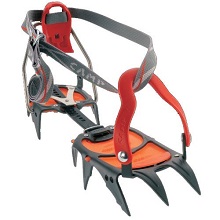
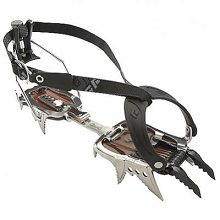
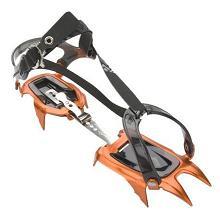
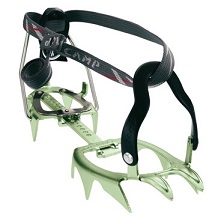
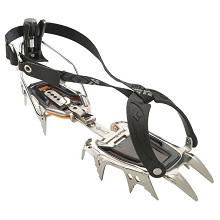 |
|
|
Crampon
Name
|
Image
|
Heel
fastening mechanism
|
Weight
(grams)
|
Fits
boot Sizes
|
Material
|
No.
of points?
|
Anti-balling
(ABS) plates?
|
Route
uses and boot types
|
Black
Diamond Cyborg crampon
|
 |
Heel
clip
|
1080
grams
|
Fits
boots
36-46
|
Stainless
steel
|
11
or 12 points
|
ABS
plates included.
|
Hard
alpine mixed routes, high-end ice and mixed climbing crampon.
Adjustable and replaceable front points that can be configured
in either dual (12 points) or mono point (11 points). |
Black
Diamond Sabretooth crampon
|
 |
Heel
clip
|
925
grams |
Fits
boots
36-46;
&46+*
|
Stainless
steel
|
12
points
|
ABS
plates included.
|
All-around
crampon for everything from moderate ice routes to big
alpine faces.
* Boot sizes 46+ can be accommodated through use of a
long bar (bought separately). |
CAMP
C12 newmatic crampons
|
 |
Heel
clip
|
1020
grams
|
Fits
boots
36-47
|
Chromoly
steel crampons
|
12
points
|
ABS
plates included.
|
Classic
mountaineering and alpine routes. newmatic binding is
ideal for B3 rigid mountain boots, or ski touring AT boots. |
CAMP
C12 universal crampons
|
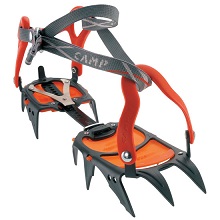 |
Heel
Strap
|
980
grams
|
Fits
boots
36-47
|
Chromoly
steel crampons
|
12
points
|
ABS
plates included.
|
Classic
mountaineering and alpine routes. The universal binding
is ideal for all boot types, including B2 or snowboard
boots. |
Black
Diamond Contact crampon
|
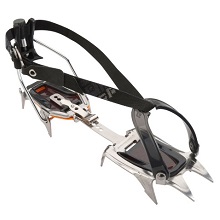 |
Heel
clip
|
808
grams
|
Fits
boots
36-46
|
Stainless
steel
|
10
points
|
ABS
plates included.
|
A
lightweight crampon, ideal for mountaineers, skiers and
hikers. The fast-adjust attachment system accommodates
almost any footwear. |
CAMP
XLC 490 universal crampon
|
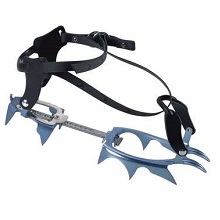 |
Heel
Strap
|
490
grams
|
Fits
boots
36-47
|
Alloy
|
12
points
|
Not
included
|
Super
light ski touring alloy crampon, with a universal binding
that is designed to fit any type of boot. |
CAMP
XLC 470 semi-auto crampon
|
 |
Heel
clip
|
470
grams
|
Fits
boots
36-47
|
Alloy
|
12
points
|
Not
included
|
Super
light ski touring alloy crampon, with a heel clip and
plastic toe bail, so ideal for ski boots |
| Black
Diamond Neve crampon |
 |
Heel
Strap |
576
grams |
Fits
boots
36-46 |
Aluminium |
10
points |
ABS
plates included. |
Ideal
super light crampon for ski mountaineering. Can accommodate
both technical and non-technical footwear. |
|
 |

 |
| Photo
of the day - updated every time the page loads |

|
 |
|
 |





|
 |
Key
ropework
If you are on a climbing or skiing course, you may
wish to refresh or learn some of the key knots and
ropework before your trip. Click on a knot on the
left to visit the page that explains the 9 most
popular knots that you might use, as well as the
1:3 and 1:5 rescue hoists. |
|
|
|
|
